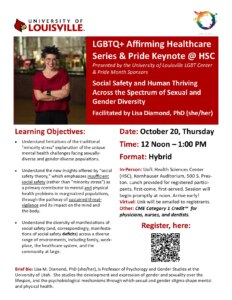
- This event has passed.
University of Louisville Pride Keynote & LGBTQ+ Affirming Healthcare Series
October 20, 2022 @ 8:00 am - November 3, 2022 @ 9:00 am
On behalf of the UofL LGBT Center, we hope you will plan to attend the Pride Keynote & LGBTQ+ Affirming Healthcare Series presentation and share the opportunity in your networks. The program is FREE, thanks to generous sponsors and donors; will be offered in a hybrid format; in-person guests who register will receive a complimentary lunch; and continuing education credits will be offered. Participants are welcome to attend the session, whether or not they plan on completing the series.
Description:
For over two decades, the minority stress model has guided research on the health of sexually-diverse individuals (those who are not exclusively heterosexual) and gender-diverse individuals (those whose gender identity/expression differs from their birth-assigned sex/gender). According to this model, the cumulative stress caused by stigma and social marginalization fosters stress-related health problems. Yet studies linking minority stress to physical health outcomes have yielded mixed results, suggesting that something is missing from our understanding of stigma and health. Social safety may be the missing piece. Social safety refers to reliable social connection, inclusion, and protection, which are core human needs that are imperiled by stigma. The absence of social safety is just as health-consequential for stigmatized individuals as the presence of minority stress, because the chronic threat-vigilance fostered by insufficient safety has negative long-term effects on cognitive, emotional, and immunological functioning, even when exposure to minority stress is low. We argue that insufficient social safety is a primary cause of stigma-related health disparities and a key target for intervention.
Learning Objectives:
- Understand limitations of the traditional “minority stress” explanation of the unique mental health challenges facing sexually-diverse and gender-diverse populations
- Understand the new insights offered by “social safety theory,” which emphasizes insufficient social safety (rather than “minority stress”) as a primary contributor to mental and physical health problems in marginalized populations, through the pathway of sustained threat-vigilance and its impact on the mind and the body.
- Understand the diversity of manifestations of social safety (and, correspondingly, manifestations of social safety deficits) across a diverse range of environments, including family, workplace, the healthcare system, and the community at large


